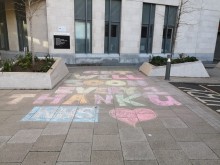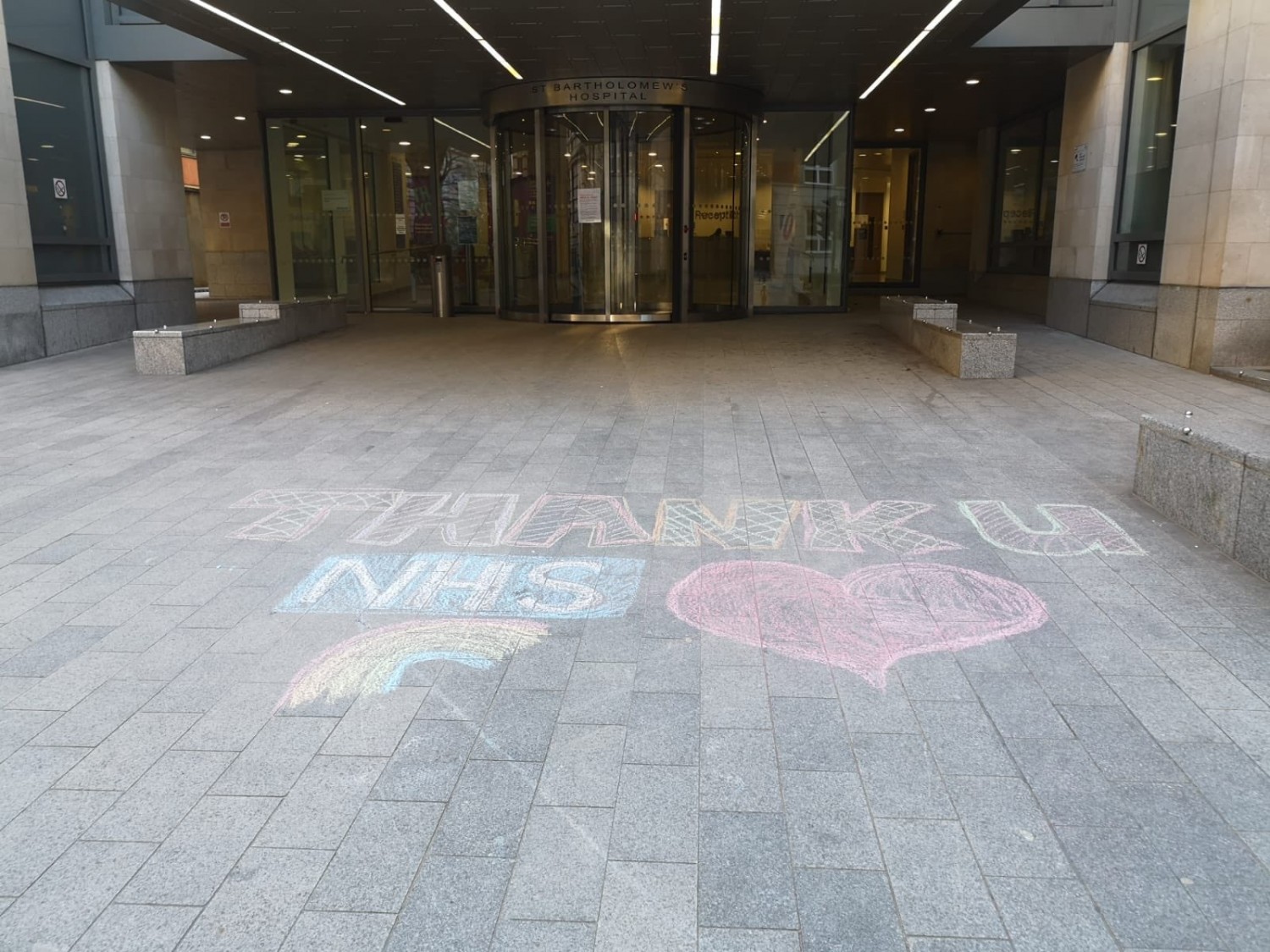
In this blog I will share my experiences and thoughts over the next weeks and months. I also want to tell your stories, so I am asking staff members across the NHS to send me your uplifting anecdotes and photos because, if we pull together and support our peers, we will get through this. Please send your photos and stories to @DocDeaner.
I’m on call at Bart’s today. We’re on for heart-attack patients and have completed our first case already (it’s just after 10am). The cardiac wards are quiet at the moment, but we’re aware that COVID patients are arriving elsewhere in the hospital. It still feels like the lull before the storm, but I know that others are already getting busy and dealing with challenging situations.
Cycling in this morning, I was bemused to see a young guy on an electric scooter, wearing a surgical mask but no helmet, travelling down the centre of a main road. I thought it somewhat ironic that he was trying to reduce his risk of getting COVID whilst being relatively reckless by using the scooter on a main road without a helmet! As for the surgical mask – only a few weeks ago I’d have been confused and surprised by this, but today it just seemed like the ‘new normal’.
Soon after our first case I went down to the hospital coffee bar to buy drinks for the team. I ordered three coffees and was about to pay when a guy ahead of me insisted on purchasing the drinks for us. So thanks, Paddy, that was a very kind and generous gesture. Adversity brings out the best in us, and it’s these sorts of stories I hope to share in this blog. I’m sure many of you will come across similar positive incidents, the sort of stuff that makes you feel better about our fellow humans. Please send them to me to share. You can dm them to me on twitter on @DocDeaner.
I’ve been reflecting on the last few months: in January, when we first heard about a viral epidemic in China, I remember thinking it could be another SARS- or MERS-type scenario, or even similar to the H5N1 pandemic (bird flu) a few years back. In the case of the latter, it caused concern but there was soon a vaccine, and although a lot of people were affected, it passed and never really had a significant impact on most of the population.
I followed the news closely back in January and it soon became clear that this was rather different. We saw how the Chinese, having downplayed the virus for the first few weeks, started to take things very seriously. We watched as they took what we thought were draconian measures that would never be possible in a Western democracy and thanked our lucky stars that it was there rather than here.
But in time, it was apparent this was highly serious contagion. Cases started appearing elsewhere. In Singapore, Hong Kong, South Korea and then Italy. Suddenly it was much closer to home.
Only a few weeks back, at the time of the first few imported cases, I sat at friends for lunch and answered their questions about what might happen. I explained that it could be very serious and have a massive impact, but I’m not sure I really had an inkling of what was to come. It still didn’t feel that close to home; I didn’t have any personal buy-in to the concern I was expressing. I’m not sure my friends understood the potential implications. One of my friends at that lunch has serious underlying health issues which put her in a high-risk group. As I left, I remarked that if there was significant spread, then she should lock herself away to be safe. She smiled and I’m sure she thought, ‘Don’t be silly, we’ll all be fine’.
A few weeks on and the whole world has changed. As a doctor reading all the various articles, both scientific and journalistic, my understanding of what lies ahead is such that I’m now trying not to think about it. In the hospitals where I work, the atmosphere has changed. It really doesn’t feel like anything I’ve ever experienced before. Suddenly units that generally aren’t that organised are sorting themselves out and making clear and sensible plans. Individuals are stepping up to the plate and displaying great leadership qualities. I was at a meeting on Friday where one of the Trust’s intensive-care consultants went through the plans for dealing with a cardiac arrest on a COVID positive patient. Some years ago she was a young doctor on my team; now I was really proud that she was taking a lead in such a difficult arena, clearly describing the process of what to do to enable effective resuscitation whilst protecting the individual doctors and nurses involved.
Here are a few of those uplifting stories I mentioned earlier – stories that highlight the good in a bad situation and restore faith in humanity:
‘I’ve been working on the COVID confirmed ward for a week now and we don’t yet have a mobile to take to patients whose relatives can’t come and see them. Yesterday my F1 called the mother of one of our patients on her own phone and took it to the patient to let them talk.’
‘We had a chap who was semi-palliative from severe urosepsis a month ago. Got better somehow. But had complete heart block. Had a pacemaker. Went home. Came back with severe hypoxia and COVID. Got better with oxygen and now home and well! Amidst the grim, that made me feel so good!'
‘I was talking to a paramedic who brought one of our MI patients in this morning. She told me how due to the reduced train service today she had to get the bus to work. She was getting frustrated at waiting when a police car pulled up at the bus stop. She wondered what she had done, but the police officers had recognised her paramedic trousers and offered her a lift, taking her all the way to work!’
‘Amazing response from junior staff at Queen Square where research fellows have paused research and joined clinical colleagues on the wards. We have a big team providing 24/7 cover and a calm, determined attitude from our trainees as they step up to the challenge.’
A tweet I saw this morning:
“Healthcare professionals are working with dedication, diligence and doubled efforts (3Ds), coupled with Energy, Enthusiasm and Empathy(3Es). To win the war on coronavirus we need coordinated care, collective thinking and collaborative efforts (3Cs)”.

And last but not least for today – thank you so much to our mystery pavement artist. Much appreciated!

About the Author
Dr Andrew Deaner is a Consultant Cardiologist at King George Hospital in Ilford and Bart's Heart Centre in Central London. He is the Head of the London School of Medicine and has been an NHS consultant since 1996.

